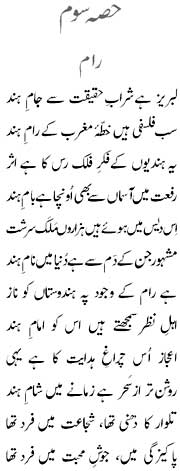
Search the Republic of Rumi
|
Chapter 43
The Vision of Nezami Ganjavi
Nezami Ganjavi (c.1141-c.1209), the Persian poet of the generation before Rumi, developed a perfect model for showing how history, literature, politics, religion and education influence each other. He prophesied about the future of Islam through the parable of the Arabian beauty Layla and her besotted lover Qais, more popularly known as Majnun or “the Madman”. Iqbal has unraveled the mystery of these metaphors: “It is now the age of openness. Now Beauty shall be revealed to all and the secret concealed by silence shall come out.”
In the next few poems Iqbal may be seen adjusting to the magnitude of Nezami’s prophecies without losing the vulnerability that makes him human.
The Royal Cemetery
Iqbal the Poet has returned to India. He is standing in a royal cemetery far from the madding crowd’s ignoble strife.
“Our hearts are not without memories of a bygone age,” he says to himself as tears begin to flow so that the eyes may see better with their light. He is performing a funeral rite because the age of kings is gone just as Nezami had foreseen. “The majesty of this nation is a thing of the past,” says Iqbal. “Its Beauty is yet to be revealed in the future.”
The Muslim Anthem
He formulates a new anthem: “China, Arabia and India are ours all alike. We are Muslims and we belong to the whole world. The Prophet is our leader and the anthem of Iqbal is the call of the marching bell: we are afoot once again.”
Territorialism
Civilization has replaced old idols with new ones and the greatest of these is the nation-state. Unfortunately it is also replacing the vision of Syed in India.
Complaint
The Poet complains to God: Islam is the only society that has proved itself a successful opponent of the race-idea and territorialism but Muslims everywhere have been enslaved or made powerless in some other way.
Rama
Ramachandra, the prince of Ayodhya who is believed by Hindus to be the seventh avatar, is seen by Iqbal as a pioneer of that which has kept the Indian civilization alive through the ages. He was an adept swordsman unsurpassed in valor, purity and the passion of love.
The Candle and the Poet
Iqbal asks the candle, “Why is it that moths lay down their lives for you while I fail to inspire my audience to that extent?”
The candle replies, “That’s because I burn due to an inner calling while you are setting yourself on fire to draw attention.”
Answer
A voice is heard from across the skies. It explains that there are no chosen people, only the true path. Non-believers are also rewarded when they follow that path. Since Muslims ignored their ideal, the task got assigned to others.
“You are a Joseph to whom every land is a homeland,” says the Voice of God. “With the power of love, lift every underdog from dust. Spread light in the world with the name of Muhammad, for reason is your shield and love is your sword.”
Education
Constant exposure to Western culture to the extent of total neglect of their own has turned the educated Muslim youth into a specimen of character whose intellectual life has absolutely no background of its own culture. It is a lost generation.
| DISCUSS |
|
 |
You have reached the end of this chapter. You may like to discuss it before reading the next.
|

Search the Republic of Rumi
|
The twelfth century Persian poet Nezami Ganjavi had a vision about the future of the humanity, which has been incorporated into the work of the Poet.



 Special
thanks to
Special
thanks to